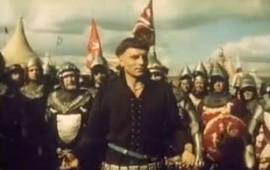
The National Film Theatre in London is showing a season of films by Laurence Olivier, and I went to see his performance of Henry V. Knowing that the film was made in 1944 as a piece of war propaganda, it was impossible not to be reminded throughout of the trials of that period, even though the play itself was written nearly 350 years earlier. (Read the play here.)
The film opens with the challenge to the English: their historical rights in France are denied; their reputation insulted; their courage and determination doubted. Slow to anger, but furious when roused. The French try to avert the coming storm, but to no avail if they will not cede to the justice of the English case. The parallels with the second world war are unavoidable.
Then, as war follows, the English leaders ostentatiously share the concerns of the common man. Or rather, not quite so ostentatiously, as Harry goes in disguise among the soldiers in their camps on the night before battle, eerily waiting what will surely come next. And then, next morning, as the soldiers assemble for battle, Laurence Olivier leaps on to a wagon to give oratorical force to the case, recalling nothing so much as the inspiration Winston Churchill gave during those dark years.
But, happily, the film ends with the promise of reconciliation, in the form of marriage between the English king and the French princess. Such a solution is foreshadowed on the French side earlier in the film, but it proves that the English have the right motives after all.
I mentioned the impression that this whole film left on me and I was referred back to the last part of “The economic causes of war” by Lionel Robbins, which was published in 1939 and concluded that:
“Somehow of other we must create a framework in which the German Geist can give its best, not its worst, to Europe. A draconian peace will do nothing. The Nazis must be extirpated; but we have neither the strength nor the will to keep Germans in subjection for ever. What more appropriate outcome of our present agonies, therefore, what more fitting consecration of the blood which is being shed, than a peace in which this great people, purged of its devils, shall be coerced into free and equal citizenship of the United States of Europe?”
So, even at the outset of the war, federalists were spelling out the only terms on which it could be satisfactorily concluded.
